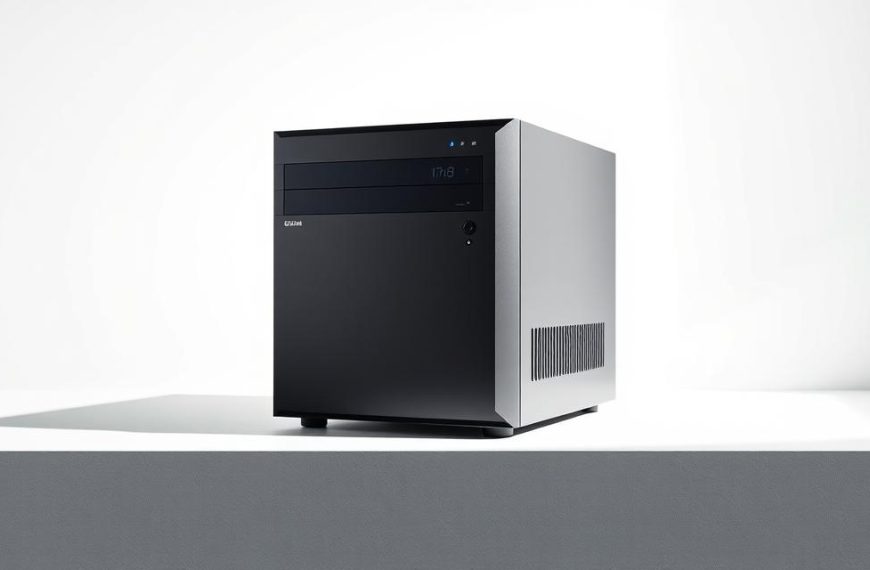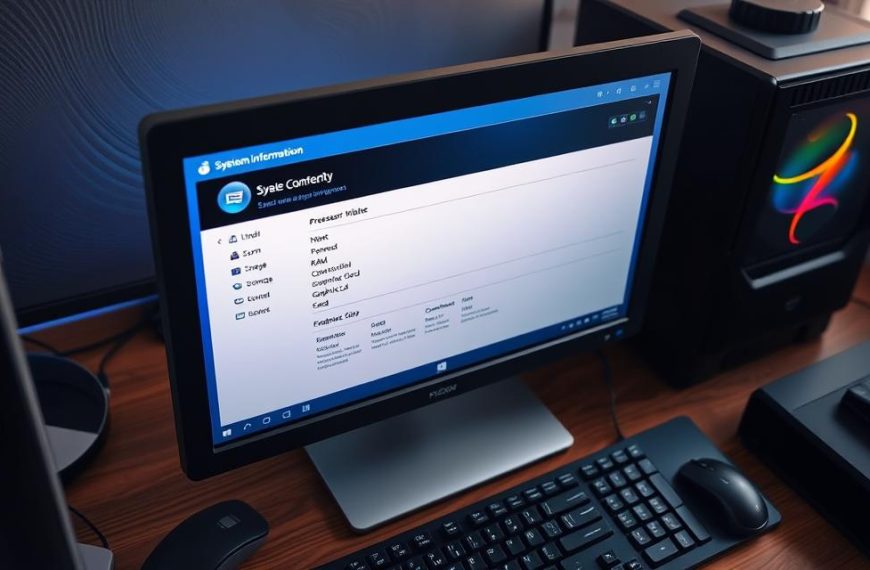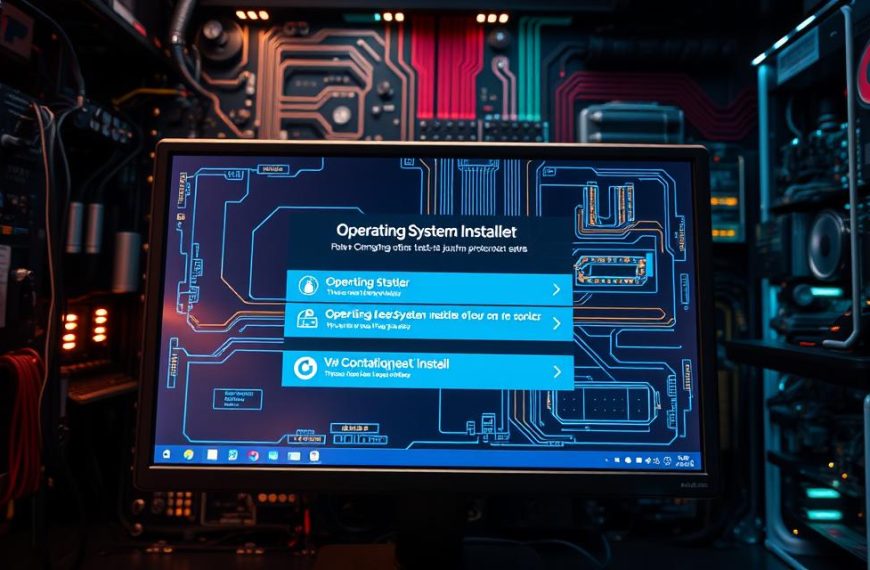Today’s organisations face a big challenge. They need to use technology wisely and make sure it fits with their main goals. This is where computer information systems experts play a key role.
These experts act as a link between tech teams and business leaders. They turn complex tech skills into strategic wins that help the company succeed.
This field combines tech know-how with business smarts perfectly. People in this area help companies go through digital transformation smoothly. They make sure tech investments pay off in real business results.
This role is more vital than ever. As companies depend more on tech, the need for computer information systems experts keeps growing. They connect new ideas with practical business use.
Understanding Computer Information Systems
Computer Information Systems are a blend of technology, people, and organisational processes. They are key to modern businesses, helping information flow smoothly and making strategic decisions. This field is vital for all business areas.
The Core Components of Information Systems
Every good information system has five main parts that work together:
- Hardware: This includes servers, computers, and networking gear
- Software: This is what runs on devices and processes data
- Data: This is the raw information that gets turned into useful insights
- Processes: These are the rules and steps that guide how the system works
- People: Users, tech experts, and managers who use the system
These parts form a system that handles and shares important organisational data. How well these elements work together shows how useful the system is to the company.
Today’s tech infrastructure balances these components well. This balance creates strong systems that meet complex business needs and grow with the company.
Historical Evolution and Modern Context
The CIS field started with simple data processing in the 1950s, mainly for basic accounting tasks. These early systems were isolated and had limited abilities.
“The development of information systems has transformed from supporting operations to driving strategic advantage”
In the 1970s, MIS emerged, bringing structured reports and basic analysis. This was the start of systems aimed at helping managers make decisions, not just process transactions.
The 1990s saw big changes with client-server systems and ERP. This time, systems connected departments, breaking down barriers and giving a wider view of the enterprise.
Now, CIS has evolved into cloud computing, big data, and AI. Today’s systems are part of complex networks that go beyond company walls and use advanced tech.
Today’s systems are key to innovation and staying ahead. They help make decisions quickly, support digital changes, and open up new business models.
The digital world keeps changing CIS, with new tech like blockchain and IoT. This ongoing change keeps CIS at the heart of business growth and tech progress.
What Does Computer Information Systems Do: Core Functions
Computer information systems professionals do vital work for today’s businesses. They manage data, create tech solutions, and keep networks running. Their efforts help information flow smoothly and support big decisions with technology.

Data Management and Analytical Processing
Data management systems are key to a company’s smartness. Experts build databases that keep info safe but easy to use. They also make sure old data is there for looking at trends.
Some of their main tasks are:
- Creating database designs
- Setting up data checks and clean-ups
- Building ETL processes
- Setting up reports for business insights
They turn simple data into useful insights. This helps companies spot trends, improve how they work, and better serve customers. It makes data more than just records.
System Development and Implementation Strategies
System implementation needs careful planning to fit business needs. Experts use set methods to design, test, and roll out systems. They work with both tech teams and business people.
They use different methods like:
- Waterfall for step-by-step work
- Agile for ongoing improvements
- Hybrid for a mix of both
Good implementation means less trouble and better system use. They set up systems to work well with what’s already there. They also make training and support plans, as seen in computer information systems resources.
Network Infrastructure and Connectivity Management
Today’s companies need strong networks for sharing info. Network management experts build and keep these networks running. They make sure devices and systems talk to each other well.
Important parts of networks include:
- LANs for inside connections
- WANs for links between places
- Cloud systems for remote access
- Security for safe data sharing
They watch network health, fix problems, and add security. They keep data moving fast and safe, which is key with more remote work and cloud use.
Bridging Business Objectives with Technological Capabilities
Computer information systems professionals are key in linking business goals with tech solutions. They turn business ideas into digital tools that help companies grow.
Translating Business Requirements into Technical Solutions
Good business requirements analysis starts with talking to all stakeholders. CIS experts use many methods to understand what the organisation needs:
- They do in-depth interviews with top managers
- They look at how things work now and what’s not working
- They write down what the system should do
- They make models of how the system will work
This makes sure the tech fits the business goals well. Turning needs into plans is a detailed process.
Optimising Operational Efficiency Through Technology
Using technology makes things run smoother in businesses. CIS solutions make tasks easier and simplify complex ones.
Today’s systems bring together different parts of a business into one flow. This cuts down on mistakes and saves time. It also lets companies make decisions faster.
Tools that track how things are doing help improve things. Businesses save money and keep quality high.
Risk Management and Cybersecurity Considerations
Good cybersecurity management is key for safe information systems. Protection plans must cover many dangers.
Important security steps include:
- Strong login systems
- Checking for security weaknesses often
- Keeping data safe with encryption
- Teaching employees about security
Following rules helps protect the business and keeps customers happy. Plans for when things go wrong are also important.
Looking ahead for risks keeps systems safe. This helps the business keep going without problems.
Career Pathways and Professional Opportunities
The computer information systems sector offers exciting career paths. It combines technology and business strategy. With more companies using digital tools, CIS careers come with good pay, job growth, and many specialisation options.

Systems Analysis and Business Technology Roles
Systems analysts connect business needs with technical solutions. They check current systems, find ways to improve, and create tech solutions that meet company goals.
They do many things, like:
- Working with stakeholders to understand needs
- Creating system plans and diagrams
- Helping development teams during setup
- Testing and checking system work
- Teaching users and making guides
Systems analysts earn a median of $93,730 a year, with a 7% job growth by 2032. This shows a high demand for these roles.
Database Administration and Management Careers
Database administration experts manage an organisation’s data. They ensure data is available, correct, and safe. They use database systems to store and get data efficiently.
Key tasks for database admins include:
- Creating and setting up database structures
- Improving database speed and solving problems
- Setting up backup and recovery plans
- Managing database security and access
- Following data protection rules
Database admins earn a median of $98,860 a year. They are in high demand in healthcare, finance, and tech.
Network Architecture and Security Specialisations
Network security careers focus on making and keeping networks safe. These experts protect data from cyber threats and ensure networks work well.
Network architects and security experts do things like:
- Designing and setting up network systems
- Setting up firewalls and detecting intrusions
- Watching network traffic for threats
- Creating plans for disaster recovery and business continuity
- Doing security checks and finding vulnerabilities
With more cyber threats, these jobs are very secure. Network architects make $126,900 a year, and info security analysts make $112,000, both with high growth rates.
Emerging Fields and Future Career Trends
The CIS field is always changing. Cloud computing specialists help move infrastructure and apps to the cloud, making things more flexible and cost-effective.
Data science roles mix statistics with business insight, finding important information in big data. These jobs need skills in machine learning and predictive analytics.
Other areas growing include:
- IoT security for connected devices
- Blockchain consultants
- AI ethics and compliance officers
- Digital transformation consultants
As tech advances, CIS careers will keep being exciting and rewarding. Those who keep learning and adapting to new tech will find lots of opportunities in these fields.
Conclusion
Computer information systems are key in linking business dreams with tech reality. They help companies turn big plans into action with the right tech tools.
The future of CIS looks bright as digital changes speed up everywhere. Companies use these systems to stay ahead and work better.
For those in tech, CIS offers great chances to grow. There’s a big need for experts in areas like systems analysis and network security.
To do well, you must keep learning new tech skills. It’s important to know about the latest from Microsoft, Oracle, and Cisco. You also need to understand what businesses need now.
In today’s complex digital world, CIS experts are vital. They help companies reach their goals by using tech wisely.
FAQ
What is the primary role of computer information systems in an organisation?
Computer information systems connect business goals with technology. They help organisations use technology to gain an edge. CIS experts turn business needs into technical solutions. This boosts efficiency, aids in decision-making, and drives growth.
What are the core components of a computer information system?
The main parts are hardware, software, data, processes, and people. Together, they manage and share information. This helps organisations make smart choices and run smoothly.
How have computer information systems evolved over time?
Information systems have grown from simple data processing to advanced enterprise solutions. Advances like cloud computing and AI have shaped this growth. Now, CIS is key to the digital economy.
What functions do computer information systems professionals perform?
They manage data, design databases, and develop technology solutions. They also look after network systems. This ensures information flows well.
How do CIS professionals translate business requirements into technical solutions?
They start by understanding business needs. Then, they create technical plans that meet these needs. This ensures technology supports the organisation’s goals.
What role does risk management play in computer information systems?
Risk management is vital. It includes keeping data safe, following rules, and protecting against threats. CIS experts use these measures to safeguard information.
What career opportunities are available in computer information systems?
Jobs range from systems analysts to network specialists. New areas like cloud computing and data science are also emerging. The field offers great career paths with high demand.
What is the job outlook for professionals in computer information systems?
The outlook is bright, with more jobs in data management and security. Experts in cloud and cybersecurity are in high demand. They often earn good salaries.
How do computer information systems contribute to operational efficiency?
CIS solutions make processes smoother and faster. They automate tasks and provide accurate info. This cuts costs, improves services, and helps adapt to market changes.
What skills are essential for a career in computer information systems?
Key skills include technical know-how, analytical thinking, and problem-solving. Good communication is also vital. It helps connect tech teams with business leaders.















